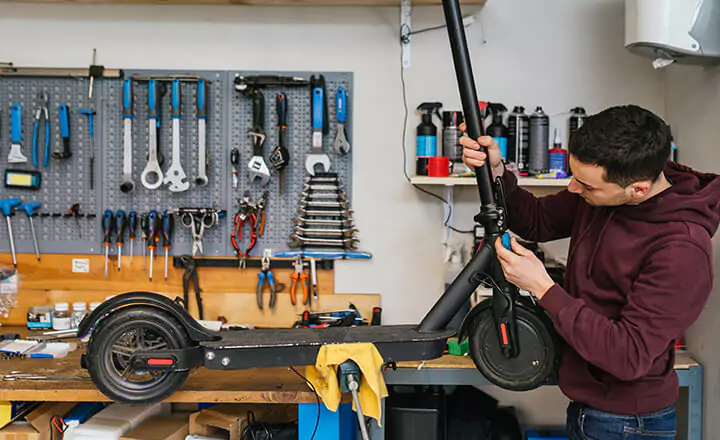Essential Tools for Small Engine Repair Shops
Having the right tools on hand can make the difference between a quick fix and a prolonged repair, impacting both customer satisfaction and shop efficiency. Here is a guide to the essential tools every small engine repair shop should have.
Table of Contents
Choosing the Right Small Engine Tools
Must-Have Small Engine Repair Tools
Final Thoughts
Whether you’re working on lawnmowers, chainsaws, or ATVs, having well-equipped tool kits for mechanics will streamline repair processes and enhance customer satisfaction. Each tool plays a crucial role in ensuring quality repairs, from specialized wrenches and diagnostic equipment to small engine repair software. This blog post explores the essential tools every small engine repair shop should have to streamline operations and deliver top-notch service. Ready to equip yourself with the basics that will propel your shop to success? Let’s dive in!
Choosing the Right Small Engine Tools
Making informed decisions when purchasing tools is vital for budget management and operational efficiency. Prioritize quality over quantity, consider your shop’s specific needs, and don’t hesitate to seek recommendations from industry peers.
Budget Considerations
While quality small engine tools may require a higher upfront cost, they last longer and perform better, making them a worthwhile investment.
Prioritizing Based on Services
New shops may start with basic tools and expand their inventory as they grow, while established shops should focus on upgrading and replacing outdated equipment.
Gain valuable insights on how to start a small engine repair business
Must-Have Small Engine Repair Tools
1. Basic Hand Tools

No repair shop can function without the essential repair equipment. High-quality hand tools form the backbone of small engine repair — they are versatile, easy to use, and indispensable for day-to-day tasks.
- Socket Sets and Wrenches: Metric and standard sizes are essential for removing and reassembling engine components.
- New Shops: Invest in a mid-range set with the most commonly used sizes.
- Established Shops: Upgrade to premium, durable sets with lifetime warranties.
- Screwdrivers: A variety of flathead and Phillips screwdrivers are necessary for different fasteners.
- New Shops: A basic set with magnetic tips and ergonomic handles.
- Established Shops: Consider complete precision sets for specialized tasks.
- Pliers: Needle-nose, locking, and slip-joint pliers are versatile for gripping, bending, and cutting tasks.
- New Shops: Choose a multi-purpose set that covers essential needs.
- Established Shops: Add specialty pliers for unique repair challenges.
- Hammers and Mallets: Both steel and rubber mallets come in handy for loosening stuck parts without causing damage.
- New Shops: A basic hammer and a rubber mallet.
- Established Shops: Expand to include soft-faced hammers for delicate work.
Pro Tip: Opt for ergonomic designs that reduce hand strain during repetitive use.
2. Software Tools for Record-Keeping and Automation
Efficient operations aren’t just about physical tools — digital solutions are equally essential. They help process tickets, track inventory, schedule repairs, and maintain customer records, significantly enhancing your shop's overall productivity and professionalism.
Reduce Admin Work
In today’s digital age, small engine repair shop software is critical for streamlining operations and improving customer service. With features like automated reminders and public forms for client approvals, Orderry ensures efficiency and accuracy, allowing technicians to focus on what they do best — repairing engines.
 Smooth repair ticket processing in Orderry
Smooth repair ticket processing in Orderry
Streamline Inventory Management
Software solutions track parts inventory, schedule repairs, and maintain customer records, ensuring your shop runs smoothly. For example, Orderry offers an asset-tracking feature to organize tools and equipment, ensuring nothing gets misplaced and everything is available when needed.
 Organizing tools inventory in Orderry
Organizing tools inventory in Orderry
3. Diagnostic Tools
Efficient troubleshooting is a cornerstone of engine repair. Diagnostic tools help pinpoint issues quickly and accurately.
- Compression Tester: Essential for measuring cylinder pressure and diagnosing issues like worn piston rings or valves.
- New Shops: A budget-friendly, manual compression tester.
- Established Shops: Invest in digital testers for more precision.
- Multimeter: Useful for checking electrical components, including ignition systems and battery health.
- New Shops: A basic, reliable multimeter.
- Established Shops: High-end multimeters with advanced features and durability.
- Tachometer: Helps measure engine RPM to ensure it operates within the manufacturer’s specifications.
- New Shops: Handheld, battery-operated tachometers.
- Established Shops: Advanced models with additional features like memory recall.
4. Power Tools

While manual tools handle a lot, power tools speed up repetitive tasks, saving time and effort during repairs.
- Cordless Impact Wrench: Makes quick work of stubborn bolts and nuts.
- New Shops: A mid-range, cordless impact wrench with basic torque settings.
- Established Shops: A high-torque, brushless model with multiple speed settings.
- Electric Drill and Bits: For drilling, fastening, or removing stripped screws.
- New Shops: A compact drill with a basic set of bits.
- Established Shops: Professional-grade drills with specialty bits.
- Angle Grinder: Useful for cutting, grinding, and polishing tasks.
- New Shops: A lightweight, entry-level grinder.
- Established Shops: A heavy-duty grinder with adjustable speed settings.
5. Specialty Tools
Specialized tools make handling specific engine components easier and safer. For complex repairs, they are a must-have in your arsenal.
- Flywheel Puller: For safely removing flywheels without damaging the crankshaft or surrounding components.
- New Shops: A basic, adjustable puller that fits multiple flywheel types.
- Established Shops: A comprehensive set with multiple pullers for all engine types.
- Valve Spring Compressor: Necessary for repairing or replacing valves on four-stroke engines.
- New Shops: A manual, budget-friendly compressor.
- Established Shops: Heavy-duty, professional-grade compressors for frequent use.
- Carburetor Adjustment Tools: Many small engines require precise tuning of the carburetor to function efficiently.
- New Shops: A universal adjustment tool kit.
- Established Shops: Brand-specific tools for precision tuning.
6. Cleaning Equipment

Cleanliness is critical for ensuring engines run smoothly and last longer. Regular cleaning prevents the buildup of harmful substances that can clog filters, degrade fluids, and cause unnecessary wear on engine parts.
- Parts Washer: A solvent-based or aqueous parts washer removes grease and grime from components.
- New Shops: A small, bench-top model.
- Established Shops: Large, industrial-grade washers with higher capacity.
- Ultrasonic Cleaner: Ideal for cleaning carburetors and other small, intricate parts.
- New Shops: A compact cleaner with basic controls.
- Established Shops: High-capacity cleaners with adjustable frequencies.
- Compressed Air System: Essential for blowing out debris, cleaning parts, and operating pneumatic tools.
- New Shops: A portable air compressor with basic functionality.
- Established Shops: A stationary, high-capacity system for multiple tools.
7. Shop Equipment
Proper shop equipment enhances productivity, reduces the risk of injuries, and minimizes the time spent on each job. Organized and well-equipped workspaces also help build a strong reputation and trust within your community.
Tool Storage
Proper organization saves time and prevents tool misplacement.
- Tool Chests and Cabinets: Store tools in a structured and accessible manner.
- Parts Bins and Shelving: Keep spare parts and consumables neatly organized.
- Magnetic Trays: Prevent small fasteners and components from getting lost during repairs.
Ventilation
The repair process often involves exposure to harmful fumes, gases, and particulate matter from engines and fuel. Without proper ventilation, they compromise air quality and pose serious respiratory risks. Adequate airflow dilutes and removes these hazardous substances, reducing the likelihood of accidents and long-term health issues.
Safety Gear
Protective equipment saves mechanics from potential injuries, including cuts, burns, and hearing damage that can result from operating machinery and handling tools.
- Safety Glasses and Gloves: Protect eyes and hands from flying debris and harmful substances.
- Hearing Protection: Reduce exposure to high noise levels from running engines and power tools.
- Fire Extinguisher: An essential safety measure when working with flammable fuels and oils.
Final Thoughts
By equipping your small engine repair shop with these essential tools, you’ll be well-prepared to handle any repair job that comes your way. Investing in quality small engine tools pays off in the long run, as they are more durable and reliable than cheaper alternatives. Regularly assess and update your tool inventory to stay competitive and deliver the best results to your customers.



